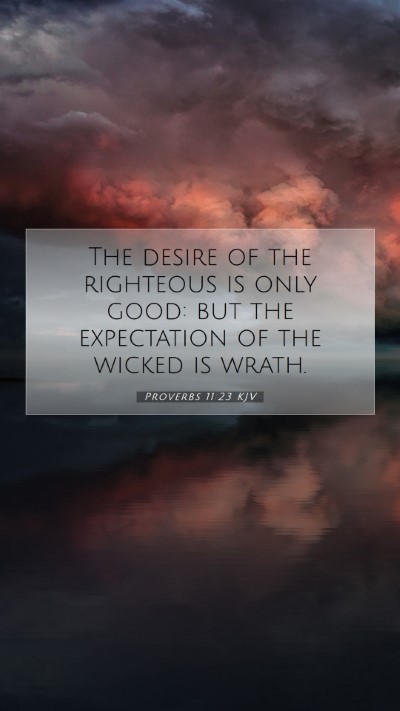Understanding Proverbs 11:23
Bible Verse: Proverbs 11:23 - "The desire of the righteous is only good: but the expectation of the wicked is wrath."
Verse Meaning and Commentary
In this verse, we find a contrast between the desires of the righteous and the expectations of the wicked. This passage reflects the broader biblical theme of the moral distinctions between righteousness and wickedness.
Insights from Public Domain Commentaries
Matthew Henry Commentary
Matthew Henry explains that the "desire of the righteous" signifies a true believer's intentions and aspirations, which are directed towards the good and beneficial. He emphasizes that the righteous seek not only their own good but also the welfare of others, illustrating a selfless character.
Albert Barnes Commentary
Albert Barnes adds that the expectation of the wicked, described as "wrath," implies the consequences of their actions. Barnes interprets this wrath as the inevitable judgment that follows their unrighteous deeds. He reinforces the idea that the wicked are always anticipating negative outcomes due to their moral choices.
Adam Clarke Commentary
Adam Clarke highlights the spiritual implications of this verse. He indicates that the righteous are sustained by hope and divine purpose, resulting in a serene anticipation of good. In contrast, the wicked's expectation reflects a troubled and fearful heart, aware of the destructive nature of their path.
Biblical Exegesis
This verse encapsulates the essence of Biblical ethics. By contrasting the desires and expectations of two distinct groups, the text prompts introspection about one’s own motivations and consequences. It serves as a profound reminder that our desires shape our lives, and the nature of our character determines the outcomes we should expect.
Key Themes
- The Righteous: Their desires align with God's will, generating positive outcomes.
- The Wicked: Their expectations are rooted in self-serving behaviors, leading to inevitable judgment.
- Moral Consequences: The verse illustrates the principle of sowing and reaping, a recurring biblical theme.
Application in Daily Life
Understanding this scripture encourages us to evaluate our desires and intentions. Are we longing for good in our lives and the lives of others? This approach can transform how we engage with the world, emphasizing the importance of aligning our aspirations with righteousness.
Related Bible Cross References
- Psalm 37:4: "Delight yourself also in the LORD: and he shall give you the desires of your heart."
- Galatians 6:7: "Be not deceived; God is not mocked: for whatsoever a man soweth, that shall he also reap."
- Proverbs 10:28: "The hope of the righteous shall be gladness: but the expectation of the wicked shall perish."
Further Study and Exploration
If you’re exploring the meaning of this Bible verse and seeking deeper insight, consider using the following Bible study tools:
- Bible study guides that delve into Proverbs.
- Online Bible study resources for group engagement.
- Courses focusing on Old Testament wisdom literature.
Conclusion
Proverbs 11:23 serves as a poignant reminder about the nature of our desires and the paths we choose. As we study this verse, we are encouraged to cultivate righteousness, fostering good desires that positively impact our lives and the lives of those around us.


